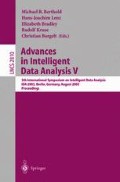Abstract
Many individuals, organizations, and companies have to answer large amounts of emails. Often, most of these emails contain variations of relatively few frequently asked questions. We address the problem of predicting which of several frequently used answers a user will choose to respond to an email. Our approach effectively utilizes the data that is typically available in this setting: inbound and outbound emails stored on a server. We take into account that there are no explicit references between inbound and corresponding outbound mails on the server. We map the problem to a semi-supervised classification problem that can be addressed by the transductive Support Vector Machine. We evaluate our approach using emails sent to a corporate customer service department.
Access this chapter
Tax calculation will be finalised at checkout
Purchases are for personal use only
Preview
Unable to display preview. Download preview PDF.
References
Androutsopoulos, I., Koutsias, J., Chandrinos, K., Spyropoulos, C.: An experimental comparison of naive bayesian and keaword based anti-spam filtering with personal email messsages. In: Proceedings of the International ACM SIGIR Conference (2000)
Baeza-Yates, R., Ribeiro-Neto, B.: Modern Information Retrieval. Addison Wesley, Reading (1999)
Bennett, P.: Assessing the calibration of naive bayes’ posterior estimates. Technical report, CMU (2000)
Boone, T.: Concept features in Re:Agent, an intelligent email agent. Autonomous Agents (1998)
Cohen, W.: Learnig rules that classify email. In: Proceedings of the IEEE Spring Symposium on Machine learning for Information Access (1996)
Crawford, E., Kay, J., McCreath, E.: IEMS – the intelligent email sorter. In: Proceedings of the International Conference on Machine Learning (2002)
Green, C., Edwards, P.: Using machine learning to enhance software tools for internet information management. In: Proceedings of the AAAI Workshop on Internet Information Management (1996)
Joachims, T.: Making large-scale svm learning practical. In: Schölkopf, B., Burges, C., Smola, A. (eds.) Advances in Kernel Methods – Support Vector Learning (1999)
Joachims, T.: Transductive inference for text classification using support vector machines. In: Proceedings of the International Conference on Machine Learning (1999)
Kolcz, A., Alspector, J.: Svm-based filtering of e-mail spam with content-specific misclassification costs. In: Proceedings of the ICDM Workshop on Text Mining (2001)
Lewis, D.: The trec-5 filtering track. In: Proceedings of the Fifth Text Retrieval Conference (1997)
McCallum, A., Nigam, K.: Employing em and pool-based active learning for text classification. In: Proceedings of the International Conference on Machine Learning (1998)
Pantel, P., Lin, D.: Spamcop: a spam classification and organization program. In: Proceedings of the AAAI Workshop on Learning for Text Categorization (1998)
Provost, F., Fawcett, T., Kohavi, R.: The case against accuracy estimation in comparing classifiers. In: Proceedings of the International Conference on Machine Learning (1998)
Sahami, M., Dumais, S., Heckerman, D., Horvitz, E.: A bayesian approach to filtering junk email. In: Proceedings of the AAAI Workshop on Learning for Text Categorization (1998)
Segal, R., Kephart, J.: Mailcat: An intelligent assistant for organizing mail. In: Autonomous Agents (1999)
Vapnik, V.: Statistical Learning Theory. Wiley, Chichester (1998)
Vorhees, E.: The trec-8 question answering track report. In: Proceedings of TREC-8 (1999)
Author information
Authors and Affiliations
Editor information
Editors and Affiliations
Rights and permissions
Copyright information
© 2003 Springer-Verlag Berlin Heidelberg
About this paper
Cite this paper
Kockelkorn, M., Lüneburg, A., Scheffer, T. (2003). Learning to Answer Emails. In: R. Berthold, M., Lenz, HJ., Bradley, E., Kruse, R., Borgelt, C. (eds) Advances in Intelligent Data Analysis V. IDA 2003. Lecture Notes in Computer Science, vol 2810. Springer, Berlin, Heidelberg. https://doi.org/10.1007/978-3-540-45231-7_3
Download citation
DOI: https://doi.org/10.1007/978-3-540-45231-7_3
Publisher Name: Springer, Berlin, Heidelberg
Print ISBN: 978-3-540-40813-0
Online ISBN: 978-3-540-45231-7
eBook Packages: Springer Book Archive

